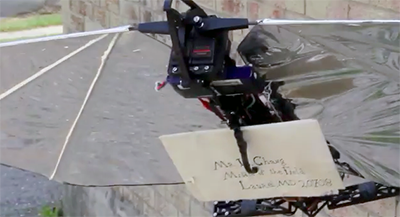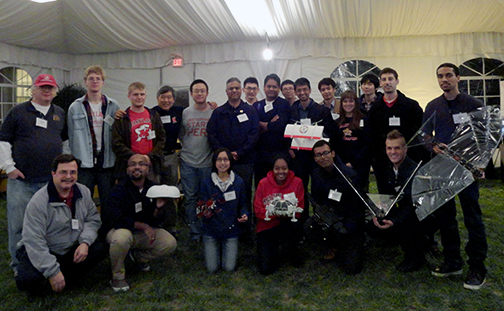News Story
Faculty Members Take On New Responsibilities
Starting this fall, the following Clark School faculty members are taking on new administrative responsibilities:
Alison Flatau Named Associate Dean for Research
After a successful period as interim associate dean of research, Alison Flatau, professor in the Clark School’s aerospace engineering department, will now become associate dean of research. She will oversee execution of our strategic plan’s research objectives; coordinate major research initiatives and “big ideas”; control distribution of Minta Martin seed funds for junior faculty and perform many other administrative tasks as she continues to teach, maintain personal research and supervise graduate students. Flatau’s research interests, supported by awards and grants from nearby federal agencies and corporations, include smart/adaptive structures with an emphasis on actuator and sensor technologies, control of underwater and aerospace systems and novel sensors for biomedical applications. She has won numerous research awards, co-authored more than 100 technical papers, served on editorial boards and as symposium chair, worked as a program director at the National Science Foundation, and been elected fellow of the American Society of Mechanical Engineers and associate fellow of the American Institute for Aeronautics and Astronautics. Flatau holds a bachelor’s degree in chemical engineering from the University of Connecticut and master and doctoral degrees in mechanical engineering from the University of Utah.
Peter Kofinas Named Associate Dean for Faculty Affairs and Graduate Programs
Peter Kofinas, professor, associate chair and director of graduate studies in the Clark School's Fischell Department of Bioengineering, will become the Clark School's associate dean for faculty affairs and the graduate program. He will continue with his bioengineering research and teaching responsibilities, but conclude his departmental associate chair and graduate studies work. As associate dean, Kofinas will manage Clark School faculty activity and workload reports, merit review, overload requests and other matters; serve as equity officer; coordinate the APT process and unit reviews; direct the Future Faculty Program; and perform many other administrative tasks. Kofinas’s highly cited research, presented in many major publications, focuses on the use of nanostructured functional polymers in applications ranging from medicine and pharmaceuticals to energy storage and microelectronics. He serves on review panels for nearby federal agencies and has pursued numerous entrepreneurial opportunities associated with his work. Kofinas has won the NSF CAREER award and the Clark School's Outstanding Junior Faculty Teaching Award, and was selected as a Keystone Professor. At the Massachusetts Institute of Technology, he received a bachelor of science degree in chemical engineering and a master of science degree in chemical engineering practice, as well as a doctoral degree in materials science and engineering from the Program in Polymer Science and Technology.
Nuno Martins Named Director of the Maryland Robotics Center
Nuno Martins, an associate professor of electrical and computer engineering who is affiliated with the Institute for Systems Research and the Maryland Robotics Center, has been named Maryland Robotics Center director. The center seeks to advance robotic systems, underlying component technologies, and robot applications through interdisciplinary research and educational programs based on a systems approach. Center faculty members, who are based in multiple Clark School departments, biology, and computer science, develop robotic sensors, actuators, structures, and communication, novel robotic platforms, and intelligence and autonomy for robotic systems. Martins, who is the winner of a National Science Foundation CAREER award, among many others, and the editorial board member of major journals in his field, pursues research in control theory, estimation, and information theory. He received the master of science degree in electrical engineering from the Technical University of Lisbon, and the doctoral degree in electrical engineering and computer science, with a minor in mathematics, from the Massachusetts Institute of Technology.
S.K. Gupta Becomes Program Director at the National Science Foundation
Satyandra K. Gupta, professor of mechanical engineering and the Institute for Systems Research and director of the Maryland Robotics Center, will go on inter-governmental personal act (IPA) assignment to serve as program director in the Robust Intelligence Cluster within the Division of Information and Intelligent Systems at the National Science Foundation. This is a two-year assignment that starts on Sept 10th, 2012. An NSF CAREER and PECASE award winner, Gupta’s research interests include computer-aided design, manufacturing automation and robotics. He has authored or co-authored more than two hundred sixty articles in journals, conference proceedings, and book chapters and is a fellow of the American Society of Mechanical Engineers and a senior member of the Society of Manufacturing Engineers and the Institute of Electrical and Electronics Engineers. Gupta has served as committee chair, conference organizer, and editorial board member for leading organizations in his field. Prior to joining the University of Maryland, he was a research scientist in the Robotics Institute at Carnegie Mellon University. He received the bachelor of engineering degree in mechanical engineering and the master of technology in production engineering from the Indian Institute of Technology, and the doctorate in mechanical engineering from the Clark School.
Published September 6, 2012





